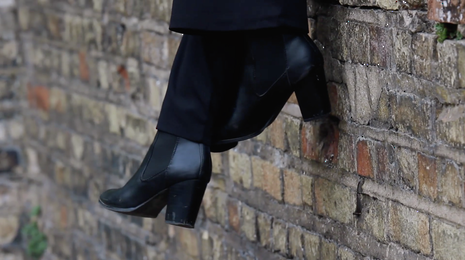I’m making sure that I don’t achieve the goals I set for myself in first year
I grew up thinking that if I wasn’t thin enough or smart enough, I was unacceptable. I haven’t rewritten this belief system yet – but at least I’ve recognised its existence

Content note: This article contains discussion of body image and eating disorders.
I remember the day I arrived in Cambridge. I was nervous, because I wanted to be perceived as ‘perfect’. In fact, I’d set myself just two goals for University: the first that I achieve stellar marks, the second was that my weight was forbidden from fluctuating – let alone increasing.
Entering the final term of my first undergraduate degree (I’m a medic), I’ve gained double-digits of kilograms, and my principal aspiration is to graduate in good health, both mentally and physically. First-year me is screaming: how could I let this happen?!
There is no clear flow-chart I can draw or equation I can write to explain my transformation, but there are a few key factors I can recognise have changed me and continue to do so.
The first was having to face academic disappointment, and finding that the shame I thought would never lift, did. No matter how hard I worked, my marks were never quite as ‘perfect’ as I had pushed for them to be. Conceptually, I understood before arriving that Cambridge was not in the same league as A-Levels, but it has taken me three years here to realise that I’ve been playing a different sport entirely.
At school, I could just devote ever more hours to reading neatly summarised books, and then regurgitate their facts and figures in the exam. That was my race, and it was one that I knew I could win. At Cambridge, year-on-year I’ve struggled with the vastness of the content, and it is only recently that I have realised that I will never be prepared ‘enough’ when I walk into the arena of the exam hall.
I will not sugar-coat the daily reality of finalist me
Equally, my exams might not go to plan, with the grade that I wish for remaining just that – a wish. How does anyone cope with the uncertainty? In my case, often not especially well. I’ve been trained to perform highly, consistently, and being faced by what I would perceive as failure is anything but easy.
Nonetheless, I believe I also have to keep asking myself: at what personal cost will I pursue success? I can no longer study the relentless hours that I used to and, actually, I don’t want to. I have loved ones I want to see, hobbies I want to keep up, and health that needs looking after. My life can no longer be second to my grades. So, I may not get the exact marks I want, and – as clichéd as it sounds – I have to try and trust that the world does keep turning, and that all the doors of future opportunities will not start closing.
The second factor – or rather, process – has been challenging the security of starvation, and learning to tolerate what, for me, had for years been intolerable: weight gain. I thought, and often still think, that I will not be perceived as beautiful at my current weight, and shape.
In your final year? Write about it.
Write for Varsity’s latest series, Ending Notes. Just email our Features team with a 150-word pitch about what’s on your mind as graduation approaches.
As someone who, for whatever reason, grew up perceiving grades and beauty to be the hallmarks of worthiness, genuinely thinking that I might not be thin, pretty, or smart enough feels like believing that I am unacceptable. I haven’t managed to rewire this belief system with a healthier one yet, but over my three years I have been able to recognise its existence for the first time, and make a start on chapter one: regaining weight, and then maintaining it, no matter how profoundly uncomfortable it has been, and continues to be. Still, in my next three years here, I hope for more. I don’t want to recover weight only to be stuck in a ‘functional’ eating disorder, still obsessing over food and judging my body as never quite measuring up. The next, and I suspect much harder step is in chapter two: total, unconditional self-acceptance.
These are lofty goals, and I am actively trying to pursue them. Nevertheless, I will not sugar-coat the daily reality of finalist me: I am petrified about my exams, and the panic is visceral – often physically, as well as mentally, intense. Think fast heart rate, sore stomach, and headaches. I have to invoke every self-soothing ability that I have within my cells, most frequently with the help of my therapist, to tame the beast of fear.
The stress has further meant that any semblance of positive body image I once had has spontaneously combusted. I am constantly needing to remind myself: in four weeks, this is all finished. Indeed, to be able to finish, I am calling once more upon the same quality that has underpinned my ability to gain weight, and to face academic dissatisfaction: courage. Neither my impending exams nor my body shape may be what I want them to be, but I have to dare myself to keep going in the face of these facts. That is what courage means to me: recognising the possibility of failure, and walking into the arena anyway. After three years of scientific education, this is perhaps still the greatest lesson I have learnt at Cambridge. Who would’ve thought.
- If you have been affected by any of the content of this article, B-eat Eating disorders provides useful information and resources, as well as a helpline at 0808 801 0677. The Students’ Union Advice Service provides a more comprehensive list of support resources.
 News / University Council rescinds University Centre membership20 February 2026
News / University Council rescinds University Centre membership20 February 2026 News / Hundreds of Cambridge academics demand vote on fate of vet course20 February 2026
News / Hundreds of Cambridge academics demand vote on fate of vet course20 February 2026 News / Cambridge academics sign open letter criticising research funding changes22 February 2026
News / Cambridge academics sign open letter criticising research funding changes22 February 2026 News / Union cancels event with Sri Lankan politician after Tamil societies express ‘profound outrage’20 February 2026
News / Union cancels event with Sri Lankan politician after Tamil societies express ‘profound outrage’20 February 2026 News / Judge Business School advisor resigns over Epstein and Andrew links18 February 2026
News / Judge Business School advisor resigns over Epstein and Andrew links18 February 2026









